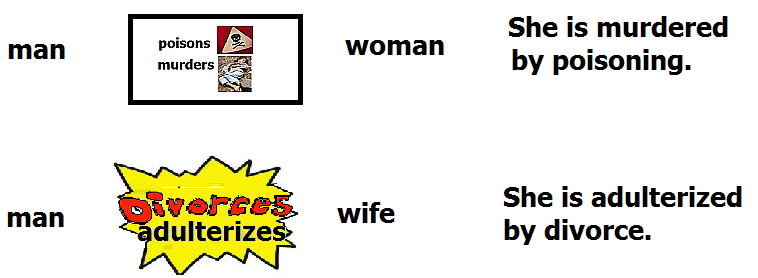RECAP: "Whosoever shall put away his wife causeth her to commit adultery." American Standard Version "maketh her an adulteress"; Complete Jewish Bible, World English Bible, and Revised Standard Version, "makes her an adulteress"; Hebrew Names Version, "makes her an adulteress"; the Message, "making her an adulteress." According to these translations, the divorcee has not committed anything. She is the object. The divorce has made her an "adulteress."
If the putting away, without Scriptural reasons, makes the woman guilty of adultery, she gets it both ways. She sins if she's guilty of fornicaation and she sins if she's not. Not only must an innocent suffer from the hardhearted spouse but must suffer from others, such as leaders of the churches. In fact, she would have "violated" one of the Ten Commandments simply by just being divorced.
Someone says, "If she doesn't marry she will be okay. Jesus is talking about if she marries." Wrong. Jesus doesn't say anything of the sort. Whatever happens to the woman happens in the divorce court. Ray Summers says that the divorcing of the woman occurs at the time when the man causes or makes his wife to experience adultery. "It is, therefore, not proper to imply, as many interpreters seem to do, that the divorcing subsequently leads to the causing of the woman to commit adultery, when she remarries. The divorcing occurs at the time of the causing, not previously to it."i
The passage in Greek is, "whosoever shall put away his wife... poiei'G4160 [makes] autenG1473 [her] moichasthaiG3429" (Verb Present Middle/Passive; Interlinear Scripture Analyzer). The verb moichasthaiG3429 is passive (notice the Greek ending ai). The verb poiei'G4160 has the husband's action of divorce making something happen to the wife.
Remember that the "passive" voice is something that is done to the woman and not by her. She is the recipient and not the actress. She's not doing it. Therefore, the one "putting away" makes her to be an adulteress. She has not committed any sexual sin or it would be in the "active" voice in the original, but she is made an adulteress by the husband's action of divorcing her.
Illustration. Consider another one of the Ten commandments, "Thou shalt not murder." Both "murder" and its Greek equivalent phoneuoG5407 are verbs. For active, "he that puts away his wife causes her to commit murder." For passive, "he that puts away his wife causes her to be murdered." Can you see the difference? The innocent wife would not have sinned. She didn't kill anyone, including herself (as the reflexive crowd argues). She hasn't done anything wrong. The guilty husband has done the sin. She suffers. Her tears are on the altar before God because of the treachery of her husband (Malachi 2:13).

R.C.H. Lenskiii comments: “We [in English] have no passive corresponding to the seemingly active ‘to commit adultery.' [used in the KJV] ...We must express the two passive forms as best we can to bring out the passive sense of the Greek forms. We [can] attempt this by translating the infinitive ‘he brings about that she is stigmatized as adulterous,’ and the finite verb, ‘he is stigmatized as adulterous.’ " To stigmatize is "to describe or regard in a way that shows strong disapproval" (Merriam Webster Online). In other words, Lenski declares that to translate the woman as committing an act of adultery is to mislead the reader. The innocent woman does not commit the adultery. She is adulterized.
Lenski believes that to translate this passage properly, it should read something like this: "But I say to you that every man releasing his wife without cause of fornication brings about that she is stigmatized as adulterous; and he who shall marry her that has been released is stigmatized as adulterous."
Baker's God's Word translation of 1995 agrees, "But I can guarantee that any man who divorces his wife for any reason other than unfaithfulness makes her look as though she has committed adultery. Whoever marries a woman divorced in this way makes himself look as though he has committed adultery" (Matthew 5:32, gw). The innocent woman does not commit anything according to Baker's, but she "looks like" she has by the man divorcing her.
This translation is logical and would harmonize not only with the nature of God but with what Paul says in 1 Corinthians 7:15, which, by the way, was written from the Holy Spirit to Christians and not to people under Moses. The unbelieving (disobedient) spouse sunders the marriage and Paul says that the believer is freed or "not under bondage." "God has called us to peace." The wronged person can remarry since the marriage has been broken, severed, and sundered by the sinning partner.
THE PART OF SPEECH CONFUSION
But why this confusion by the KJV and those that follow its lead? A main problem is obvious. Adultery is a noun in English but it is a verb in Greek. How easy is it to translate a verb from one language into a noun in another one? That means in order to translate the verb into meaningful English the translators decides to add an active verb such as commit or do. However, when they did this, they ended up with this active verb with adultery.
A verb that's kin to the noun adultery by etymology is adulterate but according to Merriam-Webster is this English word is limited to "make (something, such as a food or drink) impure or weaker by adding something of poor quality." According to Online Etymology Dictionary the origin of both adulterate and adultery go back to the 15th Century Latin adulterare "to falsify, corrupt [also] to commit adultery." Unfortunately for us, adulterate does not mean "adultery" today.
For our purpose, let's borrow this relative adulterate and use its Latin's source of "adultery." Now we can translate the Greek passive into our English passive.
“But I say unto you, That whosoever shall put away his wife, saving for the cause of fornication, causeth her to be adulterated: and whosoever shall marry her that is divorced shall be adulterized.”
You will notice that in both cases the verb is passive; that is, the guilty party has affected two lives with a consequence, but the sin is not inherited. "The soul that sins shall die" (Ezekiel 18:20).
THE FOLLOWING CLAUSE.
Notice that the result of any man that might marry the innocent divorcee is also passive. The "and" connector function is not an introduction to a causing condition, as if translated by the English “when.”iii The Greek "and" (kai) is not "when." His marriage is a separate event. This remarriage by the way is allowed for any legal divorce under Moses (Deuteronomy 24:1-4) which Law Jesus respects and champions. So publicly the sinful action of the husband has shamefully stigmatized these good people. Jesus makes certain that the Pharisees and audience understand the significance of Hillel's doctrine of free divorces.
Summary. (1) Jesus does not say that the innocent divorcee remarries. This is something that's added by some learned philosophical preacher who enjoys filling in blanks. Can we be sure that he has guessed right by putting that thought into Jesus' mouth? (2) Remember, if we add to or take away from God's Word, we are to be judged by our Father in Heaven. If we put words in our Lord's mouth, will we stand before our Savior blameless?
Note: Each Greek word actually changes form (inflection; its endings) based upon the role that it plays in the sentence. English does not do this. Grammatical voice indicates whether the subject is the performer of the action of the verb (active voice), or the subject is the recipient of the action (passive voice). If the subject of the sentence is being acted upon, then the verb is referred to as being in the passive voice. The Greek middle voice shows the subject acting in his own interest or on his own behalf, or participating in the results of the verbal action. In overly simplistic terms, sometimes the middle form of the verb could be translated as "the performer of the action actually acting upon himself" (reflexive action). The passive voice conveys the idea that the SUBJECT is being ACTED UPON by an OUTSIDE force or power. SUBJECT is the RECIPIENT or the RECEIVER of the verbal action or effect. In English, the passive voice is usually indicated by the phrase "to be". E.g., "to be murdered."
From MARRIAGE MADE FROM HEAVEN, by Gaylon West
"Did Jesus Teach For Moses Or Against Him?" See "MARRIAGE ON THE MOUNTAIN":
iRay Summers, Essentials of New Testament Greek (Broadman Press: Nashville). Referenced in https://bible.org/article/teachings-jesus-divorce-—-matthew-531-32a#P921_386323. Accessed 6/7/2014.
ii Richard C.H. Lenski. author of Commentary on the New Testament (LCNT) (12 vols.).
iiiDivorce and remarriage: Recovering the biblical view by William F. Luck (1987. https://bible.org/series/divorce-and-re-marriage-recovering-biblical-view. Accessed 6/7/2014.

